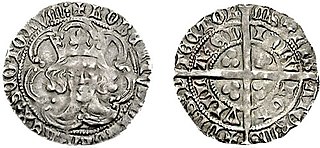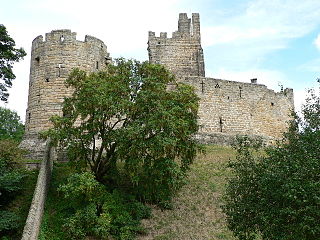Related Research Articles

Robert III, born John Stewart, was King of Scots from 1390 to his death. He was also High Steward of Scotland from 1371 to 1390 and held the titles of Earl of Atholl (1367–1390) and Earl of Carrick (1368–1390) before ascending the throne at about the age of 53 years. He was the eldest son of Robert II and Elizabeth Mure and was legitimized by the second marriage of his parents and by papal dispensation in 1349.

Ralph Neville, 1st Earl of WestmorlandEarl Marshal, was an English nobleman of the House of Neville.

Robert Stewart, Duke of Albany was a member of the Scottish royal family who served as regent to three Scottish monarchs. A ruthless politician, Albany was widely regarded as having caused the murder of his nephew, the Duke of Rothesay, and brother to the future King James I of Scotland. James was held in captivity in England for eighteen years, during which time Albany served as regent in Scotland, king in all but name. He died in 1420 and was succeeded by his son, Murdoch Stewart, Duke of Albany, who was executed for treason when James returned to Scotland in 1425, almost causing the complete ruin of the Albany Stewarts.
The Umfraville family were Anglo-Norman landowners, administrators and soldiers who were prominent from about 1120 to 1437 on the northern border of England, where they held the strategic lordships of Prudhoe and Redesdale in Northumberland. They held, for the English Crown, Tynedale to the Cumbrian Border up to the border with Scotland.

Archibald Douglas, Earl of Douglas and Wigtown, Lord of Galloway, Douglas and Bothwell, called Archibald the Grim or Black Archibald, was a late medieval Scottish nobleman. Archibald was the bastard son of Sir James "the Black" Douglas, Robert I's trusted lieutenant, and an unknown mother. A first cousin of William 1st Earl of Douglas, he inherited the earldom of Douglas and its entailed estates as the third earl following the death without legitimate issue of James 2nd Earl of Douglas at the Battle of Otterburn.

Gilbert de Umfraville, Earl of Angus was the first of the Anglo-French de Umfraville line to rule the Earldom of Angus in his own right.

Sir William Douglas "le Hardi", Lord of Douglas was a Scottish nobleman and warlord.

Sir William Douglas of Nithsdale was a Scottish knight and Northern Crusader.

Thomas de Clifford, 6th Baron de Clifford, also 6th Lord of Skipton was a Knight of The Chamber, hereditary Sheriff of Westmorland, Governor of Carlisle Castle, and Warden of the West Marches.

Prudhoe Castle is a ruined medieval English castle situated on the south bank of the River Tyne at Prudhoe, Northumberland, England. It is a Scheduled Ancient Monument and a Grade I listed building.
Sir Walter fitz Gilbert of Cadzow, 1st Laird (Lord) of Cadzow was a Scottish nobleman. The son of Gilbert fitz William of Hameldone, and husband to Mary Gordon of Huntly. The marriage date is 1308 in Cadzcow, Lanarkshire, Scotland. He is the first historically confirmed progenitor of the House of Hamilton, which includes the Dukes of Hamilton, Dukes of Abercorn and Earls of Haddington.

Ralph Lumley, 1st Baron Lumley was an English nobleman, soldier and administrator under King Richard II, who was stripped of his lands, goods and title and executed for rebelling against King Henry IV.

Henry Percy, 9th Baron Percy of Topcliffe, 2nd Baron Percy of Alnwick was the son of Henry de Percy, 1st Baron Percy of Alnwick, and Eleanor Fitzalan, daughter of Sir Richard FitzAlan, 8th Earl of Arundel, and sister of Edmund FitzAlan, 9th Earl of Arundel.
John Dunbar, Earl of Moray was a Scottish nobleman.

Robert de Umfraville, 8th Earl of Angus, of Prudhoe, Chollerton, Harbottle, and Whelpington, Northumberland was an Anglo-Norman baron in Northumberland and the eighth Earl of Angus.
Otterburn Tower is a Grade II listed castellated, three star country house hotel in Otterburn, Northumberland. It is set in 32 acres (13 ha) of deer park and woodland in the Northumberland National Park in northeastern England. Founded by a cousin of William the Conqueror in 1086, it was later owned by the Clan Hall, before being rebuilt in 1830 by Thomas James, a magistrate, on the site and using some of the stones from the Otterburn Castle. Nearby Otterburn Hall was built in 1870 on land given to a Lord Douglas as recompense for the death of his ancestor Lord William Douglas in the Battle of Otterburn.

Sir Robert de Umfraville KG, Lord of Redesdale was a knight in late-medieval England who took part in the later stages of the Hundred Years' War, particularly against Scotland. The de Umfraville family had been influential in northeast England for centuries and also held major estates in Yorkshire. His ancestors were mormaers of Angus, and his nephew married into the Percies, a powerful local marcher family with whom de Umfraville was closely associated. Much of Sir Robert's career continued on the same path as his ancestors, being primarily focused on defending the border with Scotland, which had been in a state of near-permanent warfare since the late thirteenth century.
William de Aldeburgh, 1st Baron Aldeburgh was a 14th-century English nobleman and the builder of Harewood Castle.
Gilbert de Umfraville was a 13th-century English baron. Gilbert was the eldest son of Richard de Umfraville, Lord of Redesdale. He succeeded his father as Lord of Redesdale and Baron Prudhoe from November 1226 at his seat of Prudhoe Castle. He also had lands at Otterburn.

Gilbert V de Umfraville, popularly styled the "Earl of Kyme", was an English noble who took part in the Hundred Years War. He was killed during the Battle of Baugé in 1421 fighting a Franco-Scots army.
References
- 1 2 3 4 5 6 7 8 9 J.S. Roskell; L. Clark; C. Rawcliffe, eds. (1993). "Umfraville, Sir Thomas (c.1362-1391), of Harbottle, Northumberland. and Hessle, Yorkshire". The History of Parliament: the House of Commons 1386-1421. Retrieved 10 April 2022.
- 1 2 3 4 5 6 7 8 9 10 11 12 13 George Edward Cokayne (1910). Vicary Gibbs (ed.). The Complete Peerage Of England Scotland Ireland Great Britain And The United Kingdom Extant Extinct Or Dormant. Vol. 1 (2 ed.). London: The St Catherine Press. Retrieved 10 April 2022.
- 1 2 3 4 5 6 7 Henry Summerson (25 March 2019). "Umfraville, Sir Robert (d. 1437)". Oxford Dictionary of National Biography (online ed.). Oxford University Press. doi:10.1093/ref:odnb/27992.(Subscription or UK public library membership required.)
- 1 2 3 The Scots Peerage. p. 168. Retrieved 13 April 2022.
- ↑ While Joan was the mother of Thomas the younger and his brother Robert, there is doubt over whether she was lawfully married to Thomas the elder. This does not seem to have affected the descent of lands, but could bar the descent of titles.